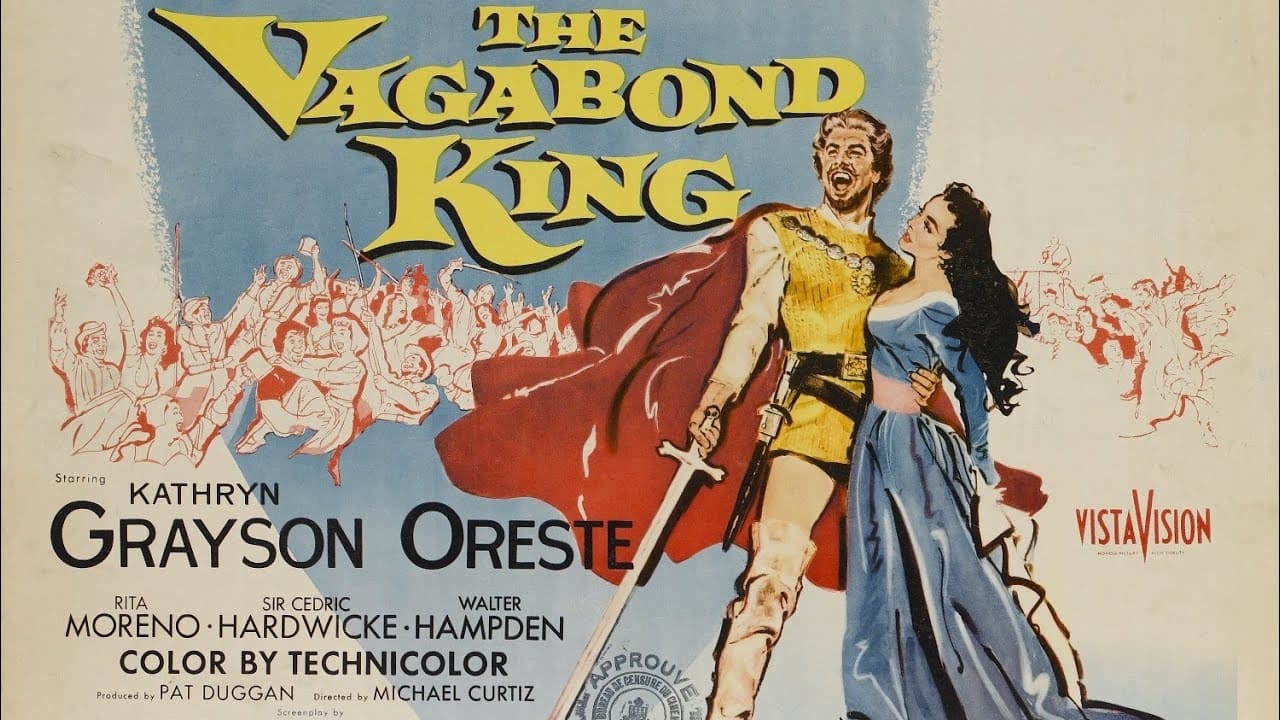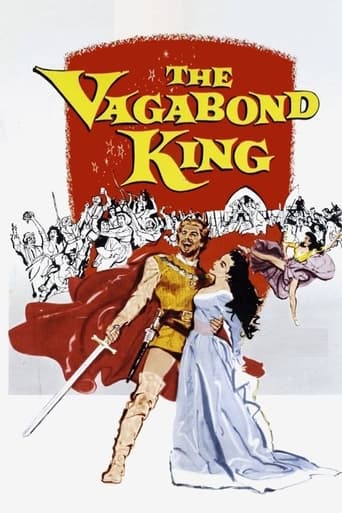Harockerce
What a beautiful movie!
Brendon Jones
It’s fine. It's literally the definition of a fine movie. You’ve seen it before, you know every beat and outcome before the characters even do. Only question is how much escapism you’re looking for.
Lidia Draper
Great example of an old-fashioned, pure-at-heart escapist event movie that doesn't pretend to be anything that it's not and has boat loads of fun being its own ludicrous self.
Edwin
The storyline feels a little thin and moth-eaten in parts but this sequel is plenty of fun.
weezeralfalfa
This story of 15th century France is based on the 1925 operetta of the same name which, in turn, is based upon the 1901 romantic novel and play "If I Were King". There was a 1930 musical film version by the same title,starring Denis King and Jeanette MacDonald, which I haven't seen. There was also a 1937 non-musical version entitled "If I were King"Kathryn Grayson(as Catherine) technically was the lead female. However, her screen time was limited, mostly devoted to solos or duets with Oreste Kirkop, as Villon: the vagabond king. The younger Rita Moreno, as Hugette, a lively tavern girl, also in love with Villion, also had several songs, and danced for or with the patrons on several occasions. She was much more involved in the doings of the rabble that Villion led, and with aiding Villion when in trouble. In contrast, Catherine was of noble birth and much less animated.Historically, this much is true: There was a long standing conflict between the province of Burgundy and the French crown, Burgundy being nearly autonomous of France. Duke Charles did head Burgundy during the relevant time of the reign of Louis XI. Francois Villon was a well known poet and suspected occasional thief during this time. However, I found no information suggesting he was the leader of a dissident group of Parisians. Indeed, Louis XI seems not to have problems with rebellion. As suggested in the film, he was rather low key, dressing simply and spending much time traveling around the countryside, interacting with the common people. He initiated a system of postal roads, thus much facilitating the communications and transportation throughout France. However, the remainder of the story is purely fictional. Charles of Burgundy wasn't killed as depicted. He was killed in a foolish war with Switzerland. This effectively ended Burgundy as a separate power from the French crown.Through most of the story, the common people of Paris were opposed to Louis, apparently because their rations were too meager, and were prepared to join with Duke Charles in deposing Louis. However, Villon, their leader, decides to take the King's offer of becoming the temporary provost marshal, until Duke Charles was subdued; thereafter being hung as a thief. Villon eventually persuades the common people to support him in a surprise attack on Duke Charles' forces when he attacks the city. Instead of closing the city gates, Villon orders that they be opened, as Charles expected. Then, the combined forces of the common people and Louis's troops would hopefully crush the Duke's forces in the narrow streets.Although this was Oreste's only feature length Hollywood film, he was quite dynamic and had a great singing voice. Mario Lanza was the original choice to play Villon, but Kathryn nixed that idea, as she hated Mario. As things turned out, she didn't like Oreste any better, and audiences weren't familiar with his name. Thus, he wasn't a draw.Nine songs are included, Rudolf Frimi composing all. However, Brian Hooker was the lyricist for those songs taken from the 1925 operetta, while Johnny Burke was the lyricist for the songs composed for the present film. Oreste got the lion's share of singing assignments. However, there are several duets with Kathryn, and Rita Moreno got several songs. "Watch Out for the Devil" was accompanied by a ballet with the combined themes of the Devil and Adam and Eve.This was Kathryn's final Hollywood film, having spent most of her career with MGM, this being a Paramount film. It was also the final film for Walker Hampden, who played King Louis. As mentioned, this was Oreste Kirkop's only appearance in a feature-length film.
marcslope
The last operetta released by a major studio, and it's a pity, for this adaptation of the 1925 Rudolf Friml war horse is pretty nimble. It stars Oreste, a European tenor with the requisite high notes and a fair amount of dash, as the leader of the Paris rabble; he's quite at ease for such a major screen debut, though his accent, so apparent in song, mysteriously disappears in much of his dialogue, making one wonder if some of his lines were post-dubbed. Kathryn Grayson is her usual shrill and simpering self, albeit in a part Callas herself couldn't have made interesting, and Rita Moreno shows a lot of life and a lot of leg as Huguette. Walter Hampden, as the king, has better lines than most screen kings, and underplays them effectively. Friml, then in his mid-70s, appended his stage score with several new melodies set to adequate Johnny Burke lyrics, and one, "This Same Heart," is quite lovely. It's a studio-bound eyeful, with big sets and colorful costumes that have little to do with reality but everything to do with screen spectacle (did 15th century Parisians really don so much purple and yellow and green?), and the screenplay's pretty erudite for this genre, and Michael Curtiz ably keeps things moving (save a brief, silly Adam and Eve ballet that stops the action dead). Nobody went to it in 1956, audiences just weren't interested in operetta anymore, and they still preferred Mario Lanza to an unknown European quantity. But if you can catch this one--I did on Amazon Prime--you'll get a fine eyeful and earful of the lush melody, sweeping spectacle, and ringing romance that endeared audiences to operetta decades before.
TheLittleSongbird
The Vagabond King did have the ingredients in the first place to be good. And it was. The story is rather old-fashioned and has a couple of dull spots, but I also think it is quite charming and well-meant too. You do forget that though when you see the lavish production values, the costumes, sets and photography are all gorgeous to look at, and hear the beautiful score and memorable songs that add so much to the film's quality. Song of the Vagabonds is especially catchy. The choreography and direction, apart from a couple of stage-bound moments, are otherwise skillful. The cast also add a lot. Kathryn Grayson is a charmer, Rita Moreno plays her role with both grace and fire and you can never go wrong with Vincent Price as narrator. The real surprise though was Oreste, handsome in looks, dashing in acting ability and ringingly resonant in voice, one does wonder why he like the film was forgotten afterwards. All in all, a very well-done film that is worthy of more appreciation. 8/10 Bethany Cox
Greg Couture
I saw this during its neighborhood run in the year of its release and remember that it made glorious use of Paramount's "high-fidelity" VistaVision process, with some very ripe Technicolor liberally applied to everything about the production (courtesy of the wonderful cinematographer, Robert Burks, who did so much outstanding work for Alfred Hitchcock.)I'd love to revisit this one, despite its very studio-bound aura. It was a feast for the eyes and also for the ears. The handsome tenor, Oreste, had the misfortune to make his screen debut as the Hollywood movie musical was about to be consigned to the fond mists of memory. He and Kathryn Grayson made a great team singing that melodic Friml music.

